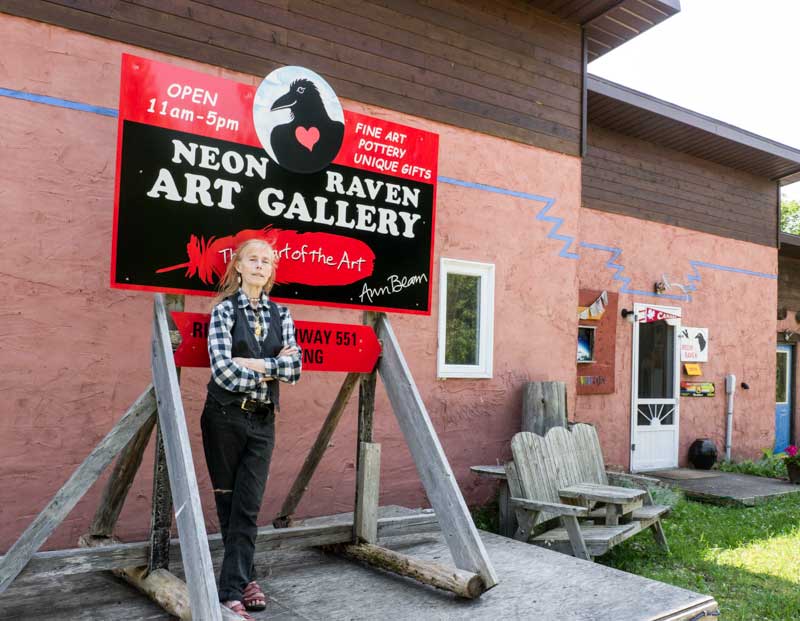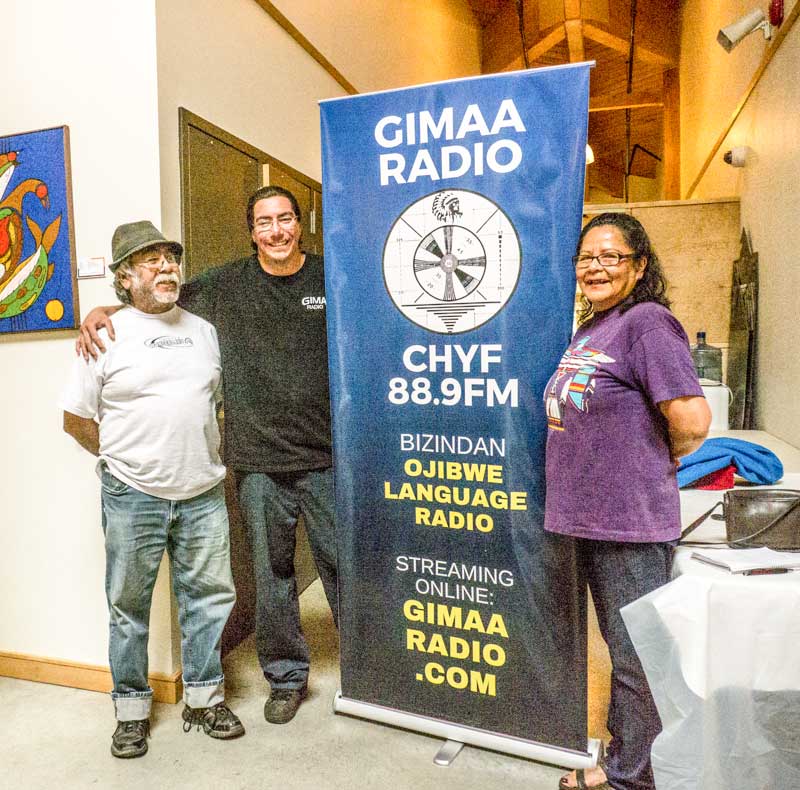M’CHIGEENG—The distinctive experiences for visitors to M’Chigeeng First Nation open wide a portal to the community and to fascinating and important cultural discoveries: the ancient history of the First Peoples of the Great Lakes Region of Northern Ontario, traditional crafts still practiced today, contemporary artistic expression, the grace and welcome of the summer powwow.
At the Ojibwe Cultural Foundation (OCF) in the heart of the community at the crossroads of Highways 540 and 551, the high-peaked rafters ring with the activities of every day during July and August. This is a fine time to explore the evocative circular building and its many enriching offerings.
The museum is a beautifully curated space that displays many pieces of great significance and spiritual meaning, including ancient scrolls, porcupine quill boxes, ash and sweetgrass baskets, jingle dress regalia, pottery and antler carvings.

(pictured) and features her paintings and ceramics and the art work of Carl Beam and Anong Migwans-Beam.
photos by Isobel Harry
The OCF has an extensive archeological collection, placed there at the request of the United Chiefs and Councils of Mnidoo Mnising (UCCM), moved from storage in Sudbury. The Ojibwe Cultural Foundation is seeking funding from Canadian Heritage to research Manitoulin-related items and sites of the collection.
“We have a mandate to represent the culture, and the Museum presents culturally authentic interpretations of Anishininaabek history, cultural practices and beliefs,” says Anong Migwans-Beam, art director. “The OCF represents the culture through language, art, stories, food, crafts and books.”
The children’s Ojibwe language immersion school is run by Kenjegwin Teg Educational Institute in M’Chigeeng and hosted by the OCF. “It’s nice to hear kids learning the language,” says Ms. Migwans-Beam, “and the ceremonies, to hear them singing and drumming. The ‘class dog’ named Wassegan keeps everyone feeling happy and safe.”
During June and July, the OCF held weekly events such as fish pie and scone making, storytelling, sweet grass picking and introductory studio sessions in etching and ceramics with Anong Migwans-Beam, an accomplished artist. “It’s a traditional open studio. We’re open to everyone,” says Ms. Migwans-Beam, “even those who just come to observe. It’s a place where contemporary ideas and traditional crafts come together.” On July 27, from 6-8 pm, she will present an Intro to Ceramics and a quillwork session. August events, exhibitions and workshops will be posted on Facebook and the OCF website.
Before the quillwork workshop last week, Ms. Migwans-Beam says she was concerned because “quills were in short supply. But the day of the workshop, someone just shows up with a porcupine for us! So we received the quills we needed to teach not only how to use quills but how to get them from a porcupine.”
“We had people from Sandfield come to sort quills—we connect over a shared activity and trying something new. The place was full; we served scone and strawberries.”
The Ojibwe Cultural Foundation began life in 1974 as an educational and cultural resource centre in a tiny wood frame building. Through the efforts of Mary Lou Fox, James Debassige and others who led the fundraising, the spacious new building was constructed and opened in 1999. Sophie Corbiere, finance officer, started working with the OCF as a summer student “in ’77 or ’78,” she says. “We brought people together around the culture, and ceremonies.”
“Each director has brought different strategies into the OCF, but bringing back traditional teachings is what they have in common, and what works,” continues Ms. Corbiere. “Alan Corbiere brought people in to learn about history with important presentations. Anong brings her art experience, and shares the culture on a regular basis. All staff are involved every weekday from 8:30 am to 4 pm and on Saturdays from 10 am to 4 pm.”
Darlene Bebonang is an affable craftsperson who took an OCF crafting course in “’94-’95,” she says. “I was a student then, now I’m a teacher.” Surrounded by her beads, quills and tools, she has been making and beading moccasins, gloves, dresses and vests for 25 years and can be found in the studio every week day from 10 am to 2 pm.
Consulting on cultural or clan teachings and traditional foods and medicines, Leona Nahwegahbow is the Elder in Residence, available to meet with anyone who asks. She speaks with visiting students (recently a class from Brock University), with the immersion school students and she gets “translation requests from all over.” Ms. Nahwegahbow attends when requested in the Healing Lodge, a tranquil, circular wood-lined chamber with seating around a fire for ceremonies and healing circles; a carved wooden tray holds the sacred plants of sweetgrass, sage, tobacco and cedar.
Alma Jean Migwans, a respected elder in the community, arrives at the small studio that houses M’Chigeeng’s Ojibwe-language radio station, GIMAA Radio, host to CHYF-FM, 88.9 on your radio dial. “The radio station was founded by my dad,” explains Ms. Migwans-Beam, whose late father, Carl Beam, became the first artist of Native ancestry to have his work purchased by the National Gallery of Canada as contemporary art. “He got the transmitter from Radio Free Berkeley via Algis and Aldona Tribinivicius who gave it to my dad. This was before computers, there was only one mic and the first broadcast was a pirate [unlicenced]. Alma Jean said a prayer to open the broadcast and the transmitter was taped to the porch.” The range was very small then and remains within the borders of the First Nation.
“I’m a consultant on the language,” says Alma Jean about her radio job. “I do weather and community events too.” Even if you don’t speak Ojibwe, her jokes followed by infectious eruptions of laughter seem to burst through any arbitrary language divides. “I laugh at myself a lot,” she says by way of explanation. “And the youth love the early morning powwow music!” Blaine Corbiere is the computer technician who loves “keeping the language and history alive.” The programs are recorded first, then played on air. Terry Spanish is one of the elders involved, with Evelyn Roy, as Anishinaabe language consultants, interpreters and translators. Mr. Spanish received his Masters of Education from U of T, specializing in the Ojibwe language, “a very expressive language,” he says, “and one in a very big family of languages around the Great Lakes.” He was “born fluent,” and has spent 50 years researching, learning and teaching. “We are re-invigorating the language and restoring lost meanings,” Terry Spanish says, adding that sometimes he will use “words that have not been used for 40, 50 years.”
There’s much to engage with in M’Chigeeng: at the OCF; with an Aboriginal Experience at the Great Spirit Circle Trail; at Lillian’s Museum’s collection of quill boxes and baskets made by renowned weavers and artists. Continuing the long tradition of artists of the community, many practitioners exhibit at the OCF and others in their studios and galleries. Neon Raven Art Gallery is a treasure trove of art by Ann Beam, Carl Beam and Anong Migwans-Beam. Up the hill from the crossroads is Blair Debassige’s Nimkee Gallery and further still is Weengushk Film Institute, a film and television training centre dedicated to indigenous youth founded by Shirley Cheechoo.
For refreshment there’s Maggie’s Café, Seasons Restaurant and Abby’s Sunday Brunch and new, the Spirit Bear Café; there are several convenience stores, a large hardware store, and coming soon, a large grocery store. Try the quiet tree-lined sand beach with your picnic on West Bay with a day pass from Lillian’s; tent and trailer camping are also available here.
The annual powwow is on the Labour Day weekend, officially ending the Island’s powwow season in grand style. It’s a cultural explosion of dance and drum, a feast of food, colour, sound and community spirit, a welcoming celebration of the timeless and vital culture of M’Chigeeng First Nation.
Ojibwe Cultural Foundation, 15 Hwy 551, M’Chigeeng. Telephone 705- 377-4902. https://ojibweculture.ca and on Facebook.
M’Chigeeng First Nation: www.mchigeeng.ca




